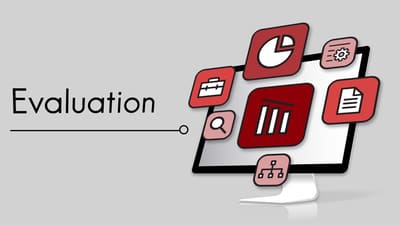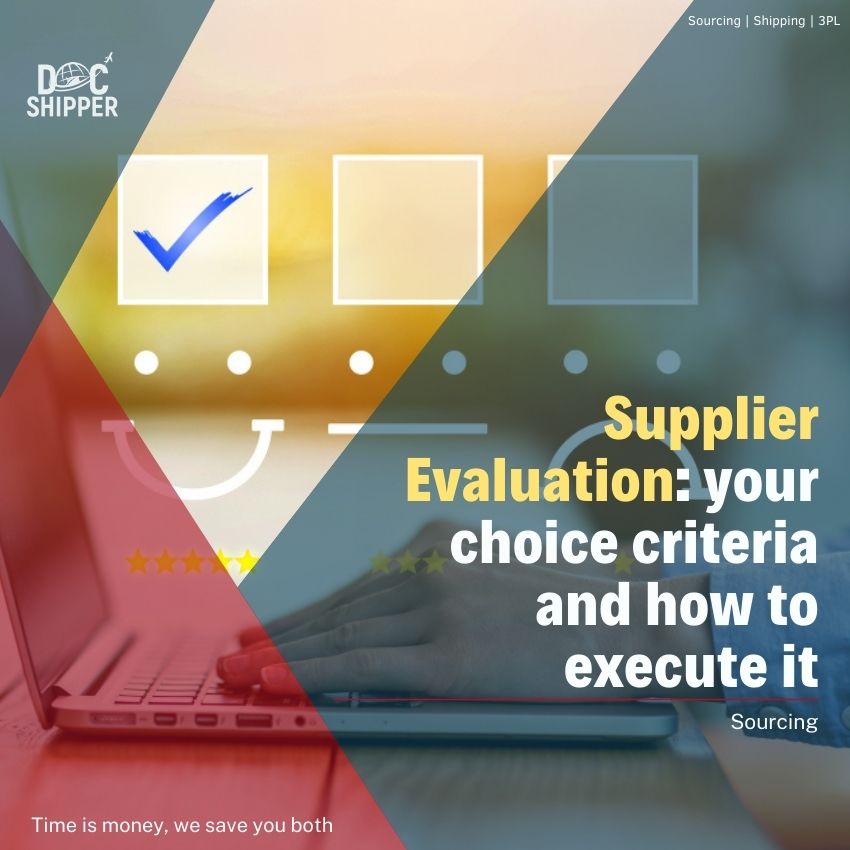Almost all industries have suppliers that include distributors, manufacturers, importers, and service providers. Because there are frequently multiple options available, conducting supplier evaluations assists businesses in selecting the solution that best suits their operational requirements. You can evaluate if this strategy of supplier picking is appropriate for enhancing your employer’s supplier connections by learning about the procedure.
DocShipper Sourcing specializes in assisting individuals and companies by providing them with specialized services like sourcing suppliers, quality control, sample production, product customization, and standard compliance.
In the following article, we explain the term “supplier evaluation“, list a few of its advantages, and go over how to go about doing it when choosing suppliers.
What is meant by supplier evaluation

The procedure that businesses employ to select suppliers and vendors for their goods or materials is known as supplier evaluation. A business may assess specific factors during this process to identify which vendor will assist it in reaching its objectives. To evaluate a supplier, you might consider the following factors:
- Price offered: For the same products, suppliers provide a range of prices. You can notice changes in market demand or availability by routinely monitoring prices.
- Product quality: This qualitatively assesses how long-lasting or efficient a supplier’s offering is. Before buying, you might ask for samples to assess the amount.
- Service provided: Prior to dealing with a provider, think about assessing the level of service they offer. Friendliness, responsiveness, and general comprehension of the needs of the organization may be considered as service criteria.
- Social responsibility: Businesses may favor vendors whose goals and values coincide with their own. Social responsibility can also refer to a supplier’s involvement in the community and charitable giving.
- Convenience: For businesses that require supplies frequently, convenience is essential. You could assess how simple it is to place an order, how soon you receive supplies, and how accommodating a supplier is to the demands of your company.
- Flexibility: Flexibility demonstrates a supplier’s capacity to scale up and down delivery in response to customer demands. If productivity varies over the year or if there are multiple sites that need supplies, this can be a crucial factor.
- Risk: Since many companies depend on their suppliers to produce the goods for their own clients, being aware of the risk might help you choose the proper source. You could evaluate the possibility of price rises or supply constraints.
DocShipper Info
Sourcing DocShipper info: The goal of DocShipper Sourcing is to assist individuals and companies with their sourcing procedures. Customers can choose from specialized services including supplier sourcing, quality control, sample production, product customization, and standard compliance. Find out more about our sourcing services and don’t hesitate to contact us for further information.
The several types of a supplier evaluation
Making business decisions might benefit from using a variety of techniques for evaluating vendors. Here are a few techniques you could employ to do a supplier evaluation:
- Scorecards: For every evaluation criterion, scorecards with a scoring system may be created. This gives you quantifiable information about each seller to evaluate vendors.
- Questionnaires: Questionnaires may offer more detailed information, such as the quality and efficiency of the communication. You could ask suppliers questions to get an explanation of some of their procedures.
- Discussions: Informal exchanges let management and teams that are familiar with the products talk about their possibilities. Discussions can assist everyone in determining the most crucial criteria when choosing a supplier because each team member may have different goals, such as cost or convenience.
- Supplier visits: Some companies arrange to meet a vendor in person to understand more about the latter’s operations. This lets you get to know essential staff members and record information about the vendor’s environment.
Steps of supplier evaluation
To evaluate a vendor, you can follow these steps:
Set your metrics
Establish your KPIs based on the most crucial factors for the company before selecting vendors. The amount of on-time deliveries, the average cost, or the number of product defects reported are a few metrics you might monitor. These performance measures can all be used to compare various suppliers. You can also take into account additional data, such as whether suppliers possess accessible feedback channels and past client ratings, to have a better understanding of how responsive they could be to adjusting business objectives.
Identify potential suppliers

After gathering metrics, you can make a list of the multiple suppliers that your company might require. These could be companies that deliver goods, produce goods, offer office supplies, or provide raw materials. You can determine which supplier could be the most crucial to the success of the company by classifying each according to priority. You can determine the extent to which you might assess each based on this classification.
Set a process for evaluation

Establishing a precise evaluation procedure might assist you in choosing a provider and keeping track of their performance. Think about who on the team can provide feedback on how to assess every factor. Sales representatives, supply chain staff members, and those of the quality assurance department who can assess the caliber and integrity of each vendor are a few examples.
Once you’ve assembled an evaluation team, choose the best strategy for evaluating suppliers. Before reporting findings to the supplier, think about setting up frequent meetings with internal teams to assess the vendor and go over their findings with leadership.
Contact and communicate with the suppliers

You may also set up quarterly or monthly meetings with suppliers to assess their performance, much like you would with your staff. To guarantee you satisfy business needs, partnering with vendors might motivate them to offer better service and products. You could discuss with the vendors what requirements they have met and what they could do better to win the company’s business in the future.
DocShipper Alert
Sourcing DocShipper alert: Finding a supplier does not guarantee that this supplier will deliver the best product. Therefore, Sourcing DocShipper offers you a quality control service to make sure your products are top quality. You can ask our experts for a free quote.
Advantages of supplier evaluation
Performing a vendor evaluation has the following major advantages:
Understand business requirements
You can assess your company’s needs by evaluating possible suppliers. Considering the materials your product requires, how frequently you must place orders, and whether production changes over the year are all examples of this. You can determine the most crucial requirements for the success of the organization by comprehending and assessing the company’s needs.
Interpretation of performance indicators

You can create key performance indicators (KPIs) to evaluate your suppliers by looking over a variety of supplier characteristics. These KPIs can assist you in determining how closely a supplier’s performance complies with your requirements and expectations. Sharing KPIs can assist in holding vendors responsible for situations where their work needs to be improved.
Improve relationships with suppliers
Through clear communication of the company’s requirements, vendor evaluations serve as helpful tools for enhancing relationships with suppliers. Initial assessments provide you the opportunity to discover more about a firm, its representatives, and crucial information such as availability and cost. You can set up regular meetings to talk about performance and create open lines of communication thanks to regular evaluations.
Identify the potential risks
Every supplier has a unique set of risks to businesses, and knowing these risks can help you prepare for emergencies. For instance, if a supplier offers varying prices, the business may end up spending more than intended on purchases. You could assign risks to every supplier as part of the evaluation process. With this knowledge, you can decide which risks might have a bigger impact on the company or how likely it is that a problem would arise. Prior to making a purchase, you can identify these risks and create a mitigation strategy to lessen their impact on your company’s operations and revenues.
Promote better performance
Companies frequently share their vendor assessments with their suppliers. Every vendor gains an understanding of how they may develop in order to win your company’s business for future requirements. For instance, you can observe that a particular provider has the greatest rates and quality, however, you need more ordering flexibility and ease over the year. The provider may then look into ways to enhance your experience and boost delivery capabilities in order to satisfy the demands of your company.
DocShipper Tip
Sourcing DocShipper tip: The purpose of supplier evaluation is to ensure that a company is working with suppliers who can provide high-quality products or services, on-time delivery, competitive pricing, and a strong partnership. If you feel overwhelmed by these procedures, you can count on our experts to conduct sourcing and suppliers quotation on your behalf. Feel free to contact our experts for further information.
Conclusion
In conclusion, supplier evaluation is a critical process for any organization that relies on external suppliers to provide goods or services. By assessing suppliers based on defined criteria, collecting data, and taking action based on the results, companies can ensure that they are working with suppliers who meet their standards, minimize risks, and improve overall performance. Effective supplier evaluation can help companies maintain a competitive edge, reduce costs, and enhance their reputation with customers. It is therefore essential that companies prioritize supplier evaluation and regularly review and update their evaluation criteria to ensure that they are meeting their needs and objectives.
DocShipper Sourcing is dedicated to helping people and businesses with their sourcing processes. Don’t hesitate to contact our experts for further information.
FAQ | Supplier Evaluation: your choice criteria and how to execute it
Read more
Looking for more? These articles might interest you:
DocShipper info: Do you like our article today? For your business interest, you may like the following useful articles :
Need Help with Logistics or Sourcing ?
First, we secure the right products from the right suppliers at the right price by managing the sourcing process from start to finish. Then, we simplify your shipping experience - from pickup to final delivery - ensuring any product, anywhere, is delivered at highly competitive prices.


Fill the Form
Prefer email? Send us your inquiry, and we’ll get back to you as soon as possible.
Contact us








